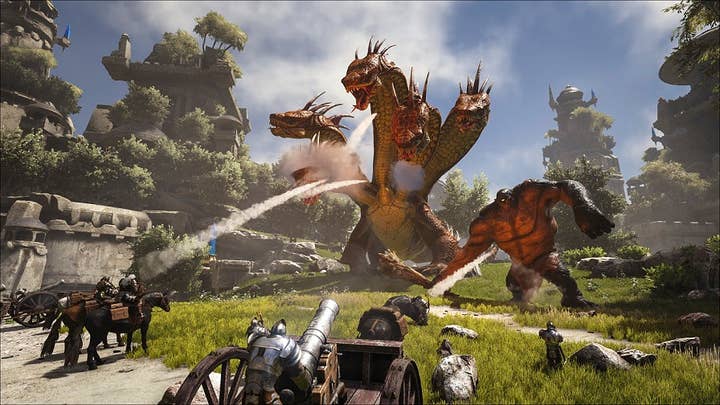Why go for a surprise launch?
Studio Wildcard and Grapeshot Games co-founders Jeremy Stieglitz and Jesse Rapczak discuss the pros and cons of debuting their new MMO Atlas on short notice
Surprise launches are all the rage these days. This month alone, Supergiant Games announced Hades and launched it into Early Access simultaneously, Capybara Games resurfaced with its long-awaited Below to say it would launch within a week, and Ark: Survival Evolved outfit Studio Wildcard announced its new pirate MMO Atlas, saying it would debut in Early Access the following week.
After the announcement, Studio Wildcard and Grapeshot Games co-founders and co-creative directors Jeremy Stieglitz and Jesse Rapczak spoke with GamesIndustry.biz to discuss their plans for the game and the recent surge in surprise launches from developers. For Rapczak, the trend is no surprise at all.
"There have been so many cases, especially recently, of hype just ruining and building up a game," Rapczak said. "This is something we've kind of done with Ark in the past, just not talking too much about what we're doing until we're ready for players to play it. Especially in the case of Atlas, what we're promising sounds so insane that you really have to play it to understand it's real. It's pointless to have six months to a year of people speculating about, 'Is this vaporware?' or 'Is this just empty promises?'
"It's pointless to have six months to a year of people speculating about, 'Is this vaporware?' or 'Is this just empty promises?'"
Jesse Rapczak
"I think other people are seeing that too. You've got long lead times for games where player expectations in no way match what's available. And I think if games are just announcing and releasing and players don't have to have all these expectations built up, they can just play the game for what it is. I think it also focuses the attention on the game rather than spreading it out over time.
"It can also be beneficial for smaller teams and people that don't have big marketing budgets to come out in the biggest way possible and get people into the game and playing it rather than just a little murmur of 'This thing's coming' and later a 'Please remember me, here we are now.'"
Surprise launches also carry advantages from the development side of things as well. Cutting together trailers, doing media interviews, and prepping other promotional materials can all detract from the focus and time developers spend on actual development, which for Stieglitz might be reason enough to go with a minimal pre-launch marketing run-up.
"I don't necessarily know that it yields a better result, honestly," he said. "I just kind of want to get introspective and work in a black box dark room on the game for as long as possible without anyone seeing it. So I don't know if it's a great media strategy; it's more of a selfish thing where I just want to develop this thing and not have to tell anybody until its 'ready.'"
Of course, that focus has a cost of its own. For example, the surprise launch meant that the team is launching an ambitious MMO without ever having run an open beta test.
"I'm sure the launch will be challenging," Stieglitz said. "They always are. It's an MMO-scale game and this is our first one. Ark was putting a foot in the water, this is jumping into the deep end... We've scale-tested this as much as we can. The one thing we haven't done that would have been useful but wasn't part of the plan is an open beta period to really stress test these systems. We've stress tested them with automation tools, but there's nothing like getting 40,000 actual, live players into your game to see how they can break it."
Eventually, there will be a stronger marketing push for Atlas, but not until next year, when the developers are convinced it's in better shape to receive a larger in-flux of players.

"One thing's for certain," Stieglitz said. "We're going to be in absolute war room mode from launch through the end of the year. It's going to be us bringing the game to life, because as soon as people get in there with this kind of a game, we can't even predict what will happen. And I don't mean from a technical standpoint, necessarily. I'm talking about from a gameplay standpoint. It's all built around emergent gameplay systems so it's going to be really unpredictable how that plays out in practice, what players are going to do with those gameplay mechanics. So we're all going to be watching closely in the days and weeks after launch."
Mid-December may seem like an unusual launch window for an MMO, but as the pair explained, it's just when the core feature set they wanted to launch with was ready. Originally they had hoped to release Atlas the same night it was announced at the Video Game Awards, but when it became clear that schedule was a bit ambitious, they pushed the launch back a week. (That still wound up being not quite enough time, so they pushed the launch back to this Wednesday, December 19.
"Also we really love ruining our Christmas vacations," Stieglitz said. "Or not having any. We're masochists like that."
It's not just Stieglitz and Rapczak's holidays at risk of being ruined now. To create Atlas, they set up a new studio called Grapeshot Games and have been on a year-long hiring spree to ensure that development on the new MMO was not coming at the expense of Ark: Survival Evolved.
"No game's going to last forever, but I think Ark has a pretty exciting 2019 ahead of it at the very least"
Jeremy Stieglitz
"Essentially we just hired a crap-ton more people," Stieglitz said. "Obviously the rub there is our own time is split. Jesse and I still supervise creatively on Ark, but we're also working on Atlas so there is overlap in that one area. But over the last year, we brought on board some really great new blood on Ark."
Rapczak added, "We assured the community personally that Ark development will continue. There's going to be more work to come next year on the Ark IP, and we let everybody know that the Ark team has been self-sufficiently updating the game, creating the new expansion, and handling the bulk console releases and the base game releases, and they'll continue to do so... Atlas will share some of the technology infrastructure stuff with Ark, but with the two dedicated teams of personnel, the community can rest assured that both games will continue development with people on both sides being passionately involved with them, listening to their feedback, putting out updates and new content on a regular basis."
That may calm any concerns about their plans for Ark in the near-term, but the longer-term plan seems less settled.
"No game's going to last forever, but I think Ark has a pretty exciting 2019 ahead of it at the very least," Stieglitz said. "There are a lot of people who play it, and it's very much in the studio's interest to continue adding and improving it so far as people are interested in the game. And well, I guess at some point a sequel is needed, right? So that's in the very early stages as well, obviously."
(After the interview, Studio Wildcard's PR representative specified that Stieglitz was speaking hypothetically about an Ark sequel.)
When asked if there was any anxiety about having the co-creative directors shifting their focus off the company's proven money maker and onto an ambitious new project, Stieglitz said the scary part is trying to do both at the same time.
"As a creator, when you have a passionate idea, you feel compelled to execute on it even though it does induce a certain amount of trepidation," he said. "And we've tried other things before and it didn't always work out. I'll give you an example: [cancelled Ark free-to-play spinoff Survival of the Fittest]. We were interested in that. We gave it a good shot, and it just didn't connect. At some point you have to say, 'Well we tried our best. It wasn't meant to be.' That's hopefully not the case with Atlas. We'll certainly give it our best shot and we're excited about it, but there's always an element of risk. All you can do is make the best quality game you can and hope people show up to play it."


